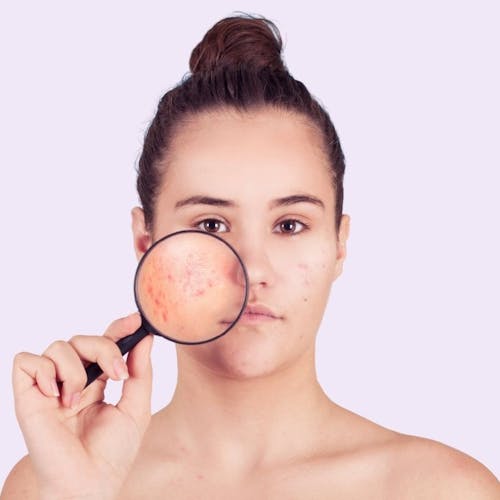This website uses cookies to enhance the user experience. By using Yoppie you are agreeing to our use of cookies.
Is Shiny Skin Natural, And How Do You Manage It?
Written by Yoppie
16 Aug 2021
What’s the difference between shiny, oily and dewy skin?
Is shiny skin healthy?
Why do I have shiny skin?
How are my hormones to blame?
How do I manage shiny skin?
What’s popular when it comes to our complexion has changed drastically in just a few short years. From matte and powdery, to dewy and demure, to naked and natural, everyone has their own preference when it comes to their skin texture and look. But what if your au naturel complexion is shiny?
We’re looking at what’s normal, how your hormones are involved, and how to manage shiny skin throughout your cycle.
What’s the difference between shiny, oily and dewy skin?
Whether you consider your skin to be shiny, oily or dewy, it’s likely that you have more sebum on your skin than most. Years ago the trend was a matte, powdery finish, but in the early 2000s, dewy skin came into fashion. Many skincare and makeup products promise to provide this look popularised by influencers; think highlighted cheekbones, and slightly moist-looking skin without the oily feel.
Oily or shiny skin however, is just a step up from dewy, but is not popular. In fact, many people pay for products that will help them avoid this look. Oily skin is due to the sebaceous glands producing too much sebum. Sebum is useful as it keeps skin hydrated, but too much can clog pores, cause blemishes, and produce a less desirable ‘greasy’ appearance.
Is shiny skin healthy?
Shiny skin may actually be a sign of skin health, since the oil that comes from the sebaceous glands contains ceramides. These are fatty acids that help form a protective barrier on skin, defending against environmental stressors like sun damage or daily pollution, and helping to regulate moisture levels. It’s totally normal and healthy for skin to have a little shine to it due to this oil, but when skin becomes overly oily it can contribute to acne, so most people like to manage shiny skin throughout the day to avoid this.
Why do I have shiny skin?
If you’re wondering what’s causing your shiny skin on a deeper level, there are a number of possibilities, and one BIG likelihood.
Firstly, your sebaceous gland activity is determined by genetics, so you may just be blessed with more oily skin than most. It can also be brought on by things like environmental factors, weather, sweating, stress, enlarged pores, certain medications, using the wrong skincare products, and surprisingly, things like over-cleansing and over-exfoliating, which strips skin of its natural oils, prompting it to produce more.
Also, many people with oily skin believe that they must skip the moisturising step, but this is a myth. In fact, using a lightweight moisturiser can actually help to balance the hydration levels in your skin, and keep it looking healthy.
So what’s the most likely cause of your shiny skin? Hormones, baby.
How are my hormones to blame?
The most significant factor affecting oily skin is hormones, which is why those going through puberty, and those who are pregnant, may find their skin flares up and produces more oil during this time. Oily skin is referred to as ‘seborrhea’, and it happens when the hormone progesterone increases in the second half of your cycle. This stimulates the production of sebum, which can lead to a buildup of oil.
Then there’s the hormone testosterone, which becomes the dominant hormone when your estrogen and progesterone levels begin to drop. This hormone also has a habit of stimulating the sebaceous glands to produce more sebum. It’s worth keeping in mind that in the second half of your cycle there is an increase in luteinizing hormones, and this can make skin prone to bacteria. It’s a good reason to take steps to avoid the spread of acne, like not picking blemishes and always taking off makeup before bed.
How do I manage shiny skin?
Managing shiny skin can be irritating, but worth it if you’re having trouble with excessive shine, makeup coming off too soon during the day, and acne on your T-zone. Here are the best ways to keep shiny skin under control:
- Create a regular, consistent skincare routine involving cleansing morning and night, or more frequently if needed, and especially after exercising and sweating
- Always use a gentle product and warm water instead of hot
- Avoid products that contain fragrances, heavy moisturisers, or anything with harsh chemicals that can irritate or dry out skin
- Try not to use washcloths or loofahs, as these can encourage the skin to produce more oil due to the friction they create, and always pat the face dry after washing
- Stick to a natural, alcohol-free toner like witch hazel to shrink pores and avoid drying the skin out too much
- Choose oil-free, water-based makeup that won’t melt off as skin produces oil
- Use blotting paper throughout the day to absorb and remove excess oil
There are home remedies and beauty products that may help, but everyone’s skin is entirely different, and what works for one person may not work for others. Similarly, what works for you at one time in your menstrual cycle may not work at another. Experiment with your skin, find the products that work best for you, and don’t be afraid of a little shine - it’s normal.
Do you get shiny skin at certain points in your cycle? Get in touch with us in our private Facebook group or on Insta @itsyoppie. Don't forget that our personalised period box can get organic tampons, hormonal supplements and much more delivered easily and regularly through your letterbox so you've got one less thing to worry about during your cycle.
Section jump
Back to top
Subscribe To Our Newsletter
YOPPIE





© 2026 Yoppie is a registered trademark of Phlo Technologies Ltd.
Yoppie's supplements are not a substitute for a varied diet and healthy lifestyle and are not intended to diagnose, treat, or cure any disease. If you are pregnant, breastfeeding, have a medical condition or are under medical supervision, please consult with your doctor before taking any of our products.






